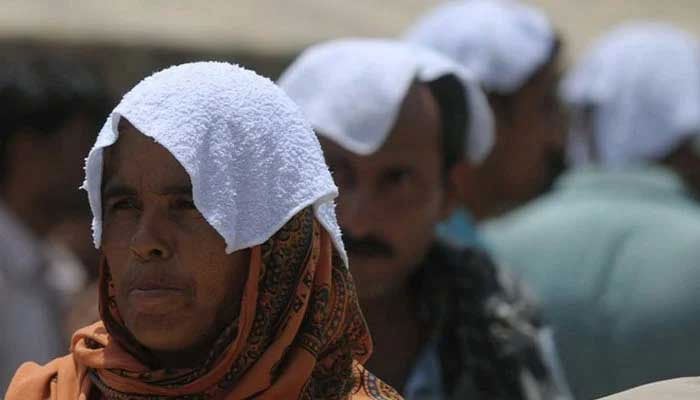Too hot to handle
Maximum temperature for May is 48.1 degrees Celsius, with a humidity ratio of 71.72 per cent
It is officially time for Pakistan to brace itself for intense heatwaves. The Met department has announced that several parts of the country are likely to witness sweltering temperatures. According to the National Disaster Management Authority (NDMA), the maximum temperature for May is 48.1 degrees Celsius, with a humidity ratio of 71.72 per cent. Reports published several weeks ago already sounded alarm over rising temperatures around the world, warning people about the potential this year holds of becoming the hottest year in history. In April, several countries in Asia faced severe heatwaves, with Bangladesh and the Philippines shutting schools to save students from heat stroke. It seems Pakistan will have to adopt similar measures, especially in cities where temperatures are going to be high. The country had its first episode of severe heatwaves in 2015 when more than 1,000 people died due to sweltering temperatures in Karachi. In 2022, Jacobabad was named the hottest city on the planet. One might wonder that after all these years, the country would have a coherent mechanism to deal with the situation, but unfortunately the reality is quite the opposite. After the 2015 heatwaves, the Sindh government, in collaboration with NGOs, set up relief camps in certain parts of Karachi, keeping chilled water for passers-by. But the initiative was short-lived. Now, neither the provincial governments nor any notable private group seems interested in dealing with the issue.
Inaction by both provincial and federal governments has been frustrating. On Monday (May 6), while hearing a climate-related case, Supreme Court Justice Mansoor Ali Shah expressed concerns over the government’s failure to set up the Climate Change Authority under the Climate Change Act of 2017. While Pakistan has faced the severe effects of rising temperatures and unusual weather patterns, it has not taken any meaningful action to mitigate the suffering of its people who have to think of homegrown solutions to beat the unbearable heat. This time, the situation is even more dire. Most education institutions and examination boards conduct their final exams in May. This puts students at greater risk. Last year, an intermediate student died in an examination hall in Khairpur due to extreme hot weather and loadshedding at the centre.
The government has to collaborate with health experts to increase awareness among people. Also, relief camps should be set up in several areas to help people in need. The working hours of daily wagers and labourers in the construction sector must be revised. Arrangements should also be made with electric companies to exempt loadshedding between 11am and 5pm, when the heat is most severe. Mobile health units should be set up to help people displaying the symptoms of heat stroke. All hospitals and private clinics should be properly equipped so that first aid can be provided to the affected people. Climate change is a big challenge, and it is the government’s responsibility to introduce timely measures to save lives.
-
 Prevent Cancer With These Simple Lifestyle Changes
Prevent Cancer With These Simple Lifestyle Changes -
 Experts Reveal Keto Diet As Key To Treating Depression
Experts Reveal Keto Diet As Key To Treating Depression -
 Inter Miami Vs Barcelona SC Recap As Messi Shines With Goal And Assist
Inter Miami Vs Barcelona SC Recap As Messi Shines With Goal And Assist -
 David Beckham Pays Tribute To Estranged Son Brooklyn Amid Ongoing Family Rift
David Beckham Pays Tribute To Estranged Son Brooklyn Amid Ongoing Family Rift -
 Jailton Almeida Speaks Out After UFC Controversy And Short Notice Fight Booking
Jailton Almeida Speaks Out After UFC Controversy And Short Notice Fight Booking -
 Extreme Cold Warning Issued As Blizzard Hits Southern Ontario Including Toronto
Extreme Cold Warning Issued As Blizzard Hits Southern Ontario Including Toronto -
 Lana Del Rey Announces New Single Co-written With Husband Jeremy Dufrene
Lana Del Rey Announces New Single Co-written With Husband Jeremy Dufrene -
 Ukraine-Russia Talks Heat Up As Zelenskyy Warns Of US Pressure Before Elections
Ukraine-Russia Talks Heat Up As Zelenskyy Warns Of US Pressure Before Elections -
 Lil Nas X Spotted Buying Used Refrigerator After Backlash Over Nude Public Meltdown
Lil Nas X Spotted Buying Used Refrigerator After Backlash Over Nude Public Meltdown -
 Caleb McLaughlin Shares His Resume For This Major Role
Caleb McLaughlin Shares His Resume For This Major Role -
 King Charles Carries With ‘dignity’ As Andrew Lets Down
King Charles Carries With ‘dignity’ As Andrew Lets Down -
 Brooklyn Beckham Covers Up More Tattoos Linked To His Family Amid Rift
Brooklyn Beckham Covers Up More Tattoos Linked To His Family Amid Rift -
 Shamed Andrew Agreed To ‘go Quietly’ If King Protects Daughters
Shamed Andrew Agreed To ‘go Quietly’ If King Protects Daughters -
 Candace Cameron Bure Says She’s Supporting Lori Loughlin After Separation From Mossimo Giannulli
Candace Cameron Bure Says She’s Supporting Lori Loughlin After Separation From Mossimo Giannulli -
 Princess Beatrice, Eugenie Are ‘not Innocent’ In Epstein Drama
Princess Beatrice, Eugenie Are ‘not Innocent’ In Epstein Drama -
 Reese Witherspoon Goes 'boss' Mode On 'Legally Blonde' Prequel
Reese Witherspoon Goes 'boss' Mode On 'Legally Blonde' Prequel




